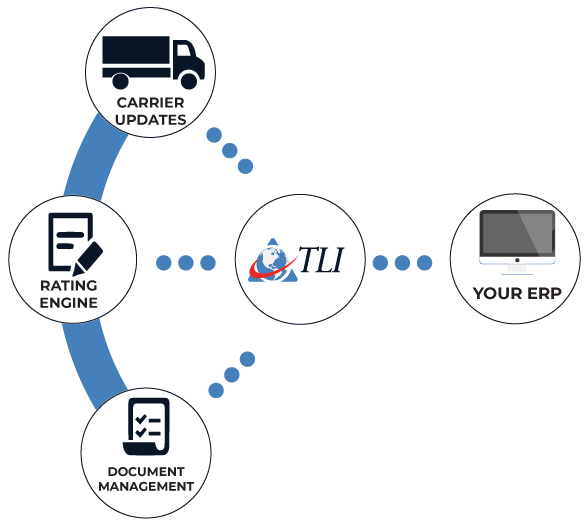The Carmack Amendment is a federal law that regulates the liability of carriers (including railroads, trucking companies, and other common carriers) for the loss or damage of goods in interstate commerce. Interstate cargo claims are governed by the Carmack Amendment (“Carmack”), 49 U.S.C §14706. Carmack controls and limits the liability of common carriers for in-transit cargo and preempts common or state law remedies that increase the carrier's liability beyond the actual loss or injury to the property.
Carmack Amendment
Carmack Amendment
What is the Carmack Amendment?
From the moment a shipment leaves the warehouse to its arrival at the destination, various factors can impact the condition and safety of the cargo. This is where the Carmack Amendment comes into play, holding crucial significance for shippers engaged in interstate transportation.
The Carmack Amendment is a federal statute that establishes a uniform liability system for carriers transporting goods across state lines in the United States.
The Carmack Amendment applies to carriers engaged in interstate transportation, including railroads, trucking companies, and other entities involved in shipping goods across state boundaries. It covers a wide range of goods transported, from commodities to household items.
The amendment is now part of the Interstate Commerce Commission Termination Act of 1995 (“ICC Termination Act”). 49 U.S.C. §14706 (2005). When enacted, Carmack established a uniform regime of recovery by interstate shippers against motor carriers and freight forwarders, and allowed a shipper to recover for actual loss or injury to the property. Now, Carmack protects the carrier from causes of action that may expose it to damages beyond the value of the goods, if all of the required conditions have been met.
Under the Carmack Amendment, carriers are provided protection from damage of the goods they transport, and provided exceptions and defenses. It is common to find limits to liability along with exceptions spelled out within carrier contracts. Common exceptions would be delivery receipts signed clear, along with freight not being packaged properly, however technical defenses include:
- Act of God: Unforeseeable events beyond the carrier's control.
- Public Enemy: Acts of war or vandalism.
- Shipper's Fault: If the shipper's improper packaging or labeling directly causes the damage.
- Inherent Vice: Natural characteristics of the goods that could cause damage.
The Carmack Amendment mandates specific documentation, primarily the bill of lading, which serves as both a receipt for the goods and a contract of carriage. It also outlines the process and timeframes for filing claims related to damaged or lost goods during transit. Shippers must typically notify carriers of any issues with the shipment promptly and file formal claims within strict time limits (usually within 5 days of delivery).
Legal Recourse
Carmack Amendment
Enacted in 1906, the Carmack Amendment is a federal law that governs the liability of carriers in cases of damaged or lost goods during interstate transportation. Essentially, it establishes a framework for the liability of carriers, such as trucking companies, ensuring accountability for the safe delivery of cargo.
Liability Protection: Shippers need to understand the Carmack Amendment as it delineates the liability of carriers. This law holds carriers responsible for the full value of the goods they transport unless certain exceptions or defenses apply. For shippers, this means having a legal foundation to hold carriers accountable for any damage or loss during transit.
Claims Process: Familiarity with the Carmack Amendment is vital for shippers when filing claims for damaged or lost goods. This law sets specific guidelines and timeframes within which claims must be filed. Understanding these regulations can streamline the claims process and ensure that shippers meet necessary requirements for compensation.
Legal Awareness: Knowing the provisions outlined in the Carmack Amendment empowers shippers to navigate legal complexities should disputes arise. It provides a basis for understanding the rights and responsibilities of both shippers and carriers, potentially mitigating conflicts through informed negotiation or legal recourse.
Contractual Agreements: Shippers often engage in contracts with carriers for transportation services. Understanding the Carmack Amendment enables shippers to draft more comprehensive and effective contracts, ensuring alignment with the law's liability provisions and establishing clear guidelines for recourse in case of mishaps.

Five things shippers need to know about the Carmack Amendment:
List of Services
-
The Carmack Amendment sets a maximum liability for carriers.List Item 1
Under the Carmack Amendment, carriers are generally liable for the actual loss or damage to goods, up to a maximum amount of $50 per pound for each package or unit. This maximum amount may be increased or decreased by agreement between the carrier and the Logistics Management Company/Shipper.
-
The Carmack Amendment applies to interstate shipments.List Item 2
The Carmack Amendment applies to shipments that are moving in interstate commerce, which means between two different states or between a state and a foreign country. It does not apply to shipments that are solely within a single state.
-
The Carmack Amendment does not apply to all types of carriers.List Item 3
The Carmack Amendment only applies to common carriers, which are carriers that offer transportation services to the general public for a fee. It does not apply to private carriers or carriers that are transporting goods for their own use, such as a restaurant sourcing their own ingredients or a School Bus driver.
-
The Carmack Amendment does not cover certain types of goods.List Item 4
There are some exceptions to the Carmack Amendment's coverage, including goods that are shipped by mail, goods that are shipped by air, and goods that are shipped under a government bill of lading.
-
The Carmack Amendment can be modified by contract.
The terms of the Carmack Amendment can be modified by agreement between the carrier and the shipper. For example, the shipper and carrier may agree to limit the carrier's liability to a specific amount, or to exclude certain types of damages from the carrier's liability. This typically results in significant improvement in the linehaul pricing as risk is mitigated by the carrier. It is important for shippers to carefully review and understand any such agreements concerning cargo liability before entering into them.
Carmack Amendment Summary
The Carmack Amendment plays a vital role in facilitating interstate commerce by providing a consistent and predictable legal framework for liability in transportation. It offers protection to both shippers and carriers by establishing clear rules governing liability and the claims process.
The Carmack Amendment's provisions often influence contractual agreements between shippers and carriers. Contracts for transportation services often incorporate or reference the Amendment's liability standards, aiming to establish clear guidelines for responsibilities and liabilities in case of loss or damage to goods during transit. If you are unsure of the contents of your contract, it is of vital importance to partner with experts like TLI who can offer a carrier sourcing RFP and lock in full protection for you as a shipper.

Carmack Amendment Recap
It is important for you as a shipper to know the exceptions for when a common carrier is NOT liable for loss or damage to the goods:
- Act of God (typically pertaining to weather)
- Act of the public enemy
- Act of public authority
- Act of the shipper
- The inherent nature or inherent vice of the goods
In order for a common carrier to be excused from liability for loss due to one of these five exceptions, the excepted cause must be the proximate cause of the damage to the goods and, more importantly, the carrier must prove itself free from negligence.
In summary, the Carmack Amendment is a federal law that sets out the liability of carriers for the loss or damage of goods in interstate commerce. It applies to common carriers, and has some exceptions for certain types of carriers and goods. The terms of the Carmack Amendment can be modified by contract between the carrier and the Shipper’s logistics solutions provider.
Please note: This blog post is intended for educational purposes only.
TLI Insights
Get the latest logistics insights and tips from Translogistics’ award-winning team. Stay ahead in transportation planning.
Questions? Email us at marketing@tli.email






